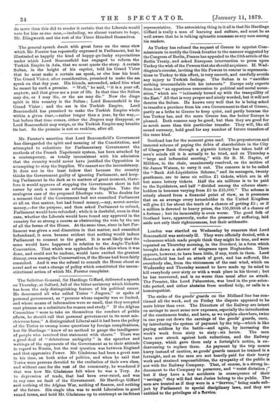The strike of the goods' guards on the Midland line
has con- tinued all the week, and on Friday the dispute appeared to be more bitter than ever. The Directors of the Railway are intent on savings to meet some new expenses, especially the introduction of the continuous brake, and have, as we explain elsewhere, twice in one year cut down the earnings of the goods' guards, once, by introducing the system of payment by the trip—which is like paying soldiers by the battle—and again, by increasing the week's work from sixty to sixty - six hours. The men have now struck against both reductions, and the Railway Company, which gave them only a fortnight's notice, is en- deavouring to replace them. As payment by the trip means hurry instead of caution, as goods' guards cannot be trained in a fortnight, and as the men are not heavily paid for their heavy work and strained responsibilities, the sympathy of the public is not with the Railway Company. That, of course, is a strong in- ducement to the Company to persevere, and " resist dictation ;" but if they have a few accidents in consequence of their "savings," they will find that Juries belong to the public. The men are treated as if they were in a "Service," being made sub- ject by Parliament to special disciplinary laws, and they are entitled to the privileges of a Service.






































 Previous page
Previous page